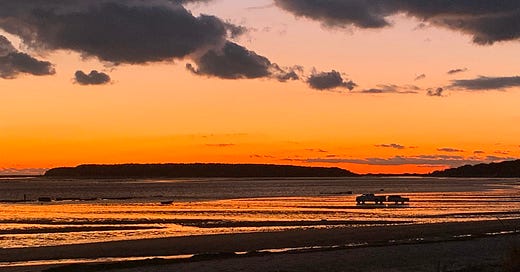Jan 10: Another step in cleaning up toxins in Hyannis; new Mass Save plan goes big; and officially, the hottest year ever.
Also, a reprieve for Alaska's Arctic Refuge, Los Angeles burns, and will Oklahoma really ban renewables?
In this week’s issue:
Cape & Islands
Hyannis community group gets additional $20K grant to fund expert analysis of toxic plume
Wellfleet may see a larger bulkhead on Mayo Beach, to protect home from flooding
Cape & Island Nonprofits & Research Institutes, Updates
Massachusetts
United States
Oklahoma might ban development of renewables (can’t believe I’m typing that)
Biden administration releases long-awaited tax-credit regulations
The American Petroleum Institute targets Vermont’s Climate Superfund Law
International
Events, Webinars, and Activities
Cape & Islands

Hyannis — Additional $20K For Independent Expert Review of PFAS Contamination on Behalf of Community
A group of Cape residents came together in 2023 to form the Hyannis PFAS Working Group (Working Group) out of concern that the Barnstable Gateway Airport and Barnstable County were not adequately addressing the PFAS, or “forever chemical” toxins, at the airport and the adjacent former Barnstable Firefighting Academy, respectively. These chemicals, linked to cancer and other health issues, seeped into the Cape’s single aquifer as the result of the use of PFAS-containing firefighting foam, over decades, both at the airport and at the academy.
On January 7, the Healey-Driscoll Administration announced a grant of $20,000 to the Hyannis Civic Association, one of the founders of the Working Group, from the Massachusetts Department of Environmental Protection Technical Assistance Grant (TAG) Program. The second such grant to the Association, it will pay for additional analysis of the extent of PFAS contamination from both the airport and the former academy sites.
The Sierra Club Cape & Islands Group and the Hyannis Park Civic Association are also partners in the Working Group. The technical expert they have engaged to perform the analysis is Tom Cambareri of Sole Source Consulting.
The importance of independent expert analysis
Ensuring that the community has funds to hire its own expert has proven critically important. Under earlier grants, “we demonstrated that the Airport’s claims about the extent of contamination are not true — its plume extends beyond the Maher Wells (see above map), and it agreed to do additional sampling after being presented with the data in a public meeting,” said Chris Powicki, member of the Working Group Steering Committee and Chair of the Sierra Club Cape & Islands Group.
Additionally, contrary to the airport’s claim, “the results of the community-based sampling of Mill Creek and analysis of recent Airport monitoring indicate that the engineered barriers (caps) have not significantly reduced downstream PFAS6 concentrations” reported Sole Source Consulting at an October, 2024 community meeting led by the Working Group.
What comes next
“Tom (of Sole Source Consulting) is providing the first integrated look at both sites on behalf of the community, and helping pinpoint areas of concern and possible continued exposure. This guides community-based educational outreach and advocacy,” explained Powicki. “The 2025-26 grant will allow this work will continue, as site characterization and cleanup activities continue across both sites,” he said.
Despite Recent Rain, Cape is Still in Mild Drought; Aquifer Level Dropped in Past Month
Energy and Environmental Affairs Secretary Rebecca Tepper has downgraded the drought status of much of Massachusetts; the Cape and Islands remain in a Level-1 Mild Drought.
“Groundwater levels are also improving in all areas, except on the Cape where groundwater is decreasing, even though it is in the normal range,” according a statement.
In an interview, Director of Water Policy at the Massachusetts Water Resources Commission, Dr. Vandana Rao said “in the past we have seen a four to six month lag” between getting percipitation on the Cape and having the level of the aquifer rise, due to the depth and size of the aquifer.
Right now, while the aquifer remains in the normal range, defined as between the 30th and 70th percentiles, over the past month, it dropped from the 46th percentile to the 35th percentile, according to Rao. “That did give us some pause,” she said.
Wellfleet — A Taller Bulkhead on Mayo Beach?
Commission weighs effects of bulkhead and added sand on neighbors and shellfish
Provincetown Independent, by Christine Legere Jan 8, 2025
Seawalls and bulkheads built to fend off coastal flooding are becoming a thing of the past here and in communities all along the Massachusetts coast.
The owner of “a decades-old wooden bulkhead at a house on Mayo Beach” is proposing to increase the height of his bulkhead by 30 inches. Full story and photos.
Cape & Island Nonprofits and Research Institutions, Updates
APCC - A Reminder from Andrew Gottlieb: Town Meeting Deadlines
The deadline for spring town meeting articles is fast approaching. If you want your town to invest in open space, fund water quality improvements, provide conservation protection to municipally-owned land, improve stormwater management, or otherwise commit to making environmental improvement—now is the time to get warrant articles submitted, so they can be voted on in the spring. Full blog.
Massachusetts
Mass Save Goes Big in its 2025-2027 Plan, Expands Free Services to Moderate Income Households and Renters
Mass Save, Massachusetts’s lead program to increase energy efficiency and cut planet-warming emissions in the building sector, has proposed an ambitious $5 Billion 2025-2027 plan, currently under review by the Massachusetts Department of Public Utility, which is expected to approve the plan by the end of February. The plan represents a 25% cost increase over Mass Save’s 2021-2024 plan.
Over the next three years, Mass Save plans to:
Support the installation of heat pumps in an additional 119,000 households
Weatherize more than 184,000 homes
Reduce GHG emissions by 1.0 million metric tons of CO2 equivalent
Provide $13.7 Billion in total benefits to customers through savings and rebates.
As context, since its inception in 2013, Mass Save has supported the installation of heat pumps in 75,000 homes and weatherized approximately 350,000 homes, according to Mass Save.
Is this enough to meet Massachusetts climate targets?
Mass Save, which is funded by Mass Save utility customers and managed by utilities — Berkshire Gas, Cape Light Compact, Eversource, Liberty, National Grid and Unitil— is critical to helping Massachusetts reach its decarbonization goals: buildings account for 35% of the state’s greenhouse gas emissions.
But even with the planned 25% budget increase, the targets fall short of what needs to happen for the state to meet its decarbonization goals, according to Mass Save. Meeting those goals would require electrifying 268,000 households at a cost of $14 Billion, utilities calculated. “The Commonwealth needs to think about where else it can get funding to achieve decarbonization goals, ” said Mary Wambui, who sits on the state Energy Efficiency Advisory Council, which oversees Mass Save and other state initiatives as reported by The Boston Globe.
Key changes in the program for 2025 - 2027, if approved:
No more rebates or incentives for fossil fuel powered heating or cooling systems, with narrow exceptions.
Expanded free weatherization and heat pump installation to include moderate income, as well as low income households.
Free services to renters, regardless of income, in 21 designated equity communities, including Oak Bluffs and Tisbury on Martha’s Vineyard. Properties in these communities with more than 50% renters will automatically qualify for the services.
Do you rent or own property on the Cape & Islands? Call Cape Light Compact
Cape Light Compact manages Mass Save for the Cape and Islands. Rebates are available for items that range from electric lawn equipment to heat pumps. Energy assessments of your property are free.
United States
A reprieve - no drilling in Alaska’s Arctic reserve…yet
Oil and gas lease sale in Alaska’s Arctic National Wildlife Refuge draws no bids
Alaska Beacon, by Yereth Rosen, Jan 8, 2025
That Interior agency was charged with managing the refuge leasing program created through a 2017 tax bill passed by a Republican-controlled Congress and signed by President Donald Trump in his first term.
The absence of bids this time, after very few bids were received in the first lease sale held four years ago, backs up Biden administration officials’ beliefs that drilling in the refuge is bad policy, said a statement released by the Interior Department.
The debate over oil development in the Arctic National Wildlife Refuge has divided Alaska Natives.
North Slope Iñupiat organizations argue that refuge development offers important economic opportunities, including the possibility of drilling on Native-owned land within the refuge boundaries….However, some of the staunchest opposition to oil development comes from the Gwich’in Athabascan people of northeastern Alaska and neighboring parts of Canada.
Alaska sued to overturn the Biden Administration’s environmental requirements on the second lease sale.
Gov. Mike Dunleavy, in a statement about the lawsuit released on Tuesday, blasted what he said was the Biden administration’s “continued and irrational opposition” to Arctic oil development – and said he looked forward to a reversal under a new Trump administration. Full story
Los Angeles Burning - What’s the role of climate change?
Inside Climate News, By Umair Irfan, Vox, Jan 8, 2025
Many factors have to converge to start a massive wildfire, and the variables aren’t all straightforward…[With regards to the effect of climate change] the key thing to pay attention to is the sequence of extreme weather. Last winter, the Los Angeles area was soaked in torrential downpours that set new rainfall records. The deluge helped irrigate a bumper crop of grasses and shrubs in the area. The region then experienced some of its all-time hottest temperatures followed by one of the driest starts to winter ever measured.
“It’s not just that drier conditions are perpetually more likely in a warming climate, it’s that this oscillation back and forth between states is something that is particularly consequential for wildfire risk in Southern California,” said Daniel Swain, a climate scientist at the University of California Los Angeles, said Wednesday during a livestream. Full story.
Meanwhile, Oklahoma may ban development of renewable energy
On Tuesday, January 7, the Freedom Brigade, a grassroots network of activists with members in several states, held a rally with hundreds of attendees at the Oklahoma State House, to send a message to lawmakers that “green initiatives are not working for Oklahoma” reported News 9.
The ralliers want Oklahoma’s Governor James Stitt to sign an executive order “to issue an executive order to stop new wind and solar energy facilities from being built” reported Heatmap.
Activists involved in planning the rally told me the biggest reason for the uproar was that solar and wind projects aren’t bringing the ample jobs developers and policymakers promise, making their presence in communities more difficult to stomach.
This uprising in Oklahoma has been happening for quite some time, without much fanfare due to a persistent and pernicious news desert problem in the state (and many others).
“Most of us do not believe we need to reduce our CO2 to begin with,” NeAnne Clinton, an activist fighting a large NextEra solar-plus-battery project in Garfield County, Oklahoma, told me. “We know that it’s a scam and we don’t support it. And we don’t support using our taxpayer money for something that we didn’t have a voice in.” Full story at Heatmap Plus, by Jael Holzman, Jan 8, 2025
Treasury finalizes long-awaited tax rules for boosting renewables
E&E News by Politico, by Christa Marshall, Jan 8, 2025
On January 7, the Biden administration finalized tax rules intended to drive some of the largest emissions reductions from the Inflation Reduction Act and spur growth in low-carbon technologies ranging from wind to nuclear power.
The regulations outline which types of projects qualify for incentives that replace the decades-old production tax credit for wind and investment tax credit for solar. They aim to drive much broader deployment of zero-carbon power by making funding contingent on how much projects cut emissions rather than if they are tied to a specific technology. Full story.
Reuters reported that “U.S. officials…said the IRA's technology-neutral clean energy program offers as much as 30% tax credits for production and investments in climate-friendly power - a perk that has been available to solar and wind projects for years.”
Well, that was fast: Vermont Sued by Fossil Fuel Interests Over Climate Superfund Law
The Associated Press, by Lisa Rathke and Michael Casey, Jan 6, 2025
The Chamber and the other plaintiff in the lawsuit, the American Petroleum Institute, argue that the federal government is already addressing climate change. And because greenhouse gases come from billions of individual sources, they argue it is impossible to measure “accurately and fairly” the impact of emissions from a particular entity in a particular location over decades. Full story.
Gravel & Shea PC, Lehotsky Keller Cohn LLP, and internal counsel are representing the Chamber and trade group.
International
Hottest year on record sent planet past 1.5C of heating for first time in 2024
Highest recorded temperatures supercharged extreme weather – with worse to come, EU data shows
The Guardian, Damian Carrington Environment editor, Jan 9, 2025
Climate breakdown drove the annual global temperature above the internationally agreed 1.5C target for the first time last year, supercharging extreme weather and causing “misery to millions of people”.
The average temperature in 2024 was 1.6C above preindustrial levels, data from the EU’s Copernicus Climate Change Service (C3S) shows. That is a jump of 0.1C from 2023, which was also a record hot year and represents levels of heat never experienced by modern humans.
Dr Friederike Otto, at Imperial College London, said: “This record needs to be a reality check. A year of extreme weather showed just how dangerous life is at 1.5C. The Valencia floods, US hurricanes, the Philippines typhoons and Amazon drought are just four disasters last year that were worsened by climate change. There are many, many more.” Full story.
Upcoming Events and Webinars
Jan 15, Virtual — Electrify Now, EV Charging at home
Organized by Electrify Now, learn everything you need to know about charging your EV at home to maximize savings and convenience. Information and registration HERE. Free.
📅Wednesday, Jan 15, 3:00 - 3:30 pm 🗺️📌 Virtual (on Zoom)
Jan 18, In Falmouth — Styrofoam Recycling
Falmouth is holding another Styrofoam recycling event on January 18, following its successful first collection of Expanded Polystyrene Foam (EPS) on November 23.
See the website for information on what items will be accepted.
📅Saturday, Jan 18, 9:00 - 12:00 pm 🗺️📌416 Gifford Street, Falmouth
Jan 22, In Person — Center for Coastal Studies, Napi’s Lecture Series: Author Dennis Minksy
Author Dennis Minsky will deliver a talk about his latest book for the first of the season’s Napi’s Lectures. More information HERE. Registration not required. Free.
📅Wednesday, Jan 22, 5:00 - 6:30 pm 🗺️📌 Center for Coastal Studies Hiebert Marine Laboratory, 5 Holway Avenue, Provincetown, MA
Feb 4, Virtual — Woodwell Climate Research Center, Our Climate Future: Fact + Fiction
How do we create a rich, nuanced vision of our climate future that can motivate and guide climate action today? This virtual event brings together a diverse panel of experts to explore the relative strengths of science and science fiction—and the potential synergies between the two—in understanding what the future might look like. Information and registration HERE. Free.
📅Feb 4, 1:30-2:30 pm 🗺️📌Virtual
More Activities: Cape Cod Conservation Calendar
Check out the calender HERE. Many events are free!
Powered by the “Communications Cohort,” co-led by the Barnstable Land Trust and APCC.














